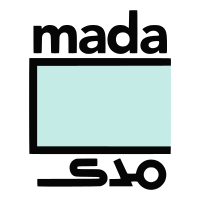Mada Masr
Mada Masr (Arabic: مدى مصر) is an independent Egyptian online newspaper, founded in June 2013 by former journalists of the English-language newspaper Egypt Independent following the shutting down of its editorial operations in April 2013. It is Egypt’s leading independent,[1] liberal newspaper.[2]
| Independent, progressive journalism | |
 | |
| Format | Online newspaper |
|---|---|
| Founded | June 30, 2013 |
| Political alignment | Left-wing |
| Language | Arabic and English |
| Country | Egypt |
| Website | Official website |
| |
History

Egypt Independent was a weekly, 24-page English-language newspaper that had evolved from the English web edition of the newspaper Al-Masry Al-Youm. Its first edition was published on 24 November 2011.[3]
In December 2011, the second edition of the newspaper was prevented from being printed, following internal censorship of an article[4] written by political scientist Robert Springborg which was critical of the Supreme Council of the Armed Forces.[5]
In April 2013, the editorial team was informed by the management of Al-Masry Media Corporation that their print and online news operation will be shut down.[6] The editorial team decided to put together a closing edition, which would have been published on 25 April, "to explain the conditions under which a strong voice of independent and progressive journalism in Egypt is being terminated".[6] However, the management decided in the last minute to withhold the printing of the final edition, so the editorial team decided to publish it online.[6][7]
The online edition of Egypt Independent was re-launched later that year.
Founding of Mada Masr
On 30 June 2013, Mada Masr published its first issue.[8][9]
In the first article published, the editorial team described the planning process for the launch: "We decided we want to publish in Arabic as well as English, that we want to see more data-based reports, more investigative journalism. We want to experiment with different ways of storytelling. And very importantly, develop a business model and deploy a visionary commercial team that helps make our work sustainable."[8]
The article also described how the editorial team arrived at the name: "It needed a name. An Arabic name that was easy to say in English, but one that also reflected our practice of independent, progressive journalism. After a long process, we came to Mada. It is the Arabic word for range, scope or span, but it's also the spot where a stone is placed on a ring, a symbol of taking a position."[8]
The article concluded with: "Today Mada Masr is born amid many challenges and uncertainties. But it's also born out of inevitability. It is the inevitability of rebuilding a home for our team and our practice, the inevitability of a different form of journalism, the inevitability of experimentation and adventure as the only gateway for our imagination to strive."[8]
Since then, Mada Masr published a number of articles on different topics such as politics, economy, environment, culture and lifestyle, and some of their articles on current affairs in Egypt were referenced by international news media.[10] As an example, an article by Sarah Carr about the political movement The Third Square[11] was quoted extensively in a New York Times blog article about the subject.[12]
Freedom of press in Egypt
In July 2013, an article by the Associated Press about media bias in Egypt following the military coup quoted Lina Atallah, editor-in-chief of Mada Masr, as saying that there was increased pressure on journalists to toe the line, pointing to the coverage of protester killings, which repeated the military's version of the violence. "What's scary about this time around in the media performance is that there is much more agenda-setting from above," she said.[13]
Mada Masr has been censored in Egypt since June 2017.[1] No official statements were issued regarding the block on websites, which also affected 20 other outlets. Mada Masr media company filed a lawsuit several weeks later, petitioning the Egyptian National Telecom Regulatory Authority (NTRA) to provide official documentation of the decision behind it, if there had been one, and technical explanation as to how the block was enacted, requesting that ISPs to remove obstacles placed to prevent users from accessing its website. NTRA denied it was responsible for administering the block, an assertion it has maintained throughout the case. A back and forth ensued, with lawyers representing Mada Masr and the Communications and Information Technology Ministry arguing that it was solely responsible, and the NTRA countering that website blocks fell under the purview of the Supreme Media Regulatory Council or a national security body, which includes the presidency, the Interior Ministry, the General Intelligence Services and Administrative Control Authority as designated by Article 1 of the communication law (Law 10/2003), According to Article 64 of the law, the Armed Forces are also considered an agency concerned with national security, when it comes to technical capabilities that include: telecommunications equipment, systems and programs. as media regulatory bodies continued to deny involvement in the blocking of access to its website, Mada Masr Media requested that the court add the president of Egypt, the defense minister, deputy head of the General Intelligence Service, the interior minister and head of the Supreme Media Regulatory Council as respondents in the case. with no information provided by the state lawyers and the NTRA, on September 30 2018, the date the court set to announce a verdict; the court referred the case for a technical review. The case would be referred to the NTRA, but because the body is a respondent in the case, it has been handed to the Authority of Experts at the Justice Ministry, essentially suspending the judicial process until an unknown date, as the ministry’s Authority of Experts could take years to examine the case, according to the lawyer Hazem Azhary.[14]
The papers' editor-in-chief, Lina Attalah, was arrested on 17 May 2020 by Egyptian security forces.[15] She was released on bail later the same day.[16]
References
- Malsin, Jared (July 18, 2018). "Throughout Middle East, the Web Is Being Walled Off". The Wall Street Journal. Archived from the original on July 19, 2018. Retrieved July 19, 2018.
“My first thought was, ‘Welcome to China,’” said a banker in Cairo, recalling his attempt to access Mada Masr, Egypt’s leading independent news organization, which has been blocked since June 2017.
- "America is no longer a force for stability in the Gulf". The Economist. 10 June 2017. Retrieved 10 June 2017.
- "Time for something new". Egypt Independent. 24 November 2011. Retrieved 4 August 2013.
- "Is Tantawi reading the public's pulse correctly?". Egypt Independent. 6 December 2011. Retrieved 8 August 2013.
- "Time for an independent conversation". Egypt Independent. 7 December 2011. Retrieved 4 August 2013.
- "Egypt Independent 2009-2013". Egypt Independent. 25 April 2013. Retrieved 4 August 2013.
- "Egypt Independent's 50th and final print edition". Scribd. 25 April 2013. Retrieved 4 August 2013.
- "And we're back ..." Mada Masr. 30 June 2013. Archived from the original on 3 August 2013. Retrieved 4 August 2013.
- "With Morsi Out, Uphill Battle for Independent Media Intensifies". Atlantic Council. 17 July 2013. Archived from the original on 23 July 2013. Retrieved 8 August 2013.
- "Top News: European Union Envoy Ashton Meets Morsi, Nears Deal to End Violence". Atlantic Council. 30 July 2013. Archived from the original on 2 August 2013. Retrieved 8 August 2013.
- "'Third Square' protesters reject Morsi, army". Mada Masr. 26 July 2013. Retrieved 4 August 2013.
- "Tahrir Taken, Some Egyptians Look for 'Third Square' to Resist Islamists and Army". New York Times. 26 July 2013. Retrieved 27 July 2013.
- "Egypt's media embrace military after Morsi ouster". Associated Press. 12 July 2013. Retrieved 8 August 2013.
- "Neither victory nor defeat: Court refers Mada Masr blocking case for technical review". Mada Masr.
- "Egyptian media outlet Mada Masr says editor Lina Attalah arrested". Al Jazeera. 17 May 2020. Retrieved 19 May 2020.
- "Egypt releases, on bail, editor-in-chief of prominent independent news outlet". Al-Monitor. 18 May 2020. Retrieved 19 May 2020.